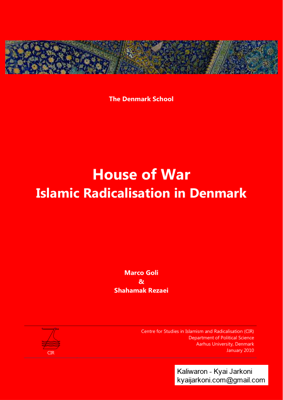by M Goli · 2010 · Cited by 5 — Islamic radicalisation among Muslim youth in Denmark. the home of Islam (Dar-ul-Islam), and it is that place where the Islamic state is established and the.
Missing: Daral | Must include: Daral
128 KB – 153 Pages
PAGE – 3 ============
The Denmark School House of War Islamic Radicalisation in De n mark Marco Goli, Associate Professor Metropol Copenhagen University College & Shahamak Rezaei, Associate Professor Department of Society and Globalisation, Roskilde University Research report prepared for the Centre for Studies in Islamism and Radicalisation (CIR) Department of Political Science Aarhus University, Denmark January 2010
PAGE – 4 ============
Islamism and Radicalisation the Denmark S chool The ambition of the Denmark School is to remedy the fragmentation between different fields of r e- search in Islamism. T he Denmark S chool wants manifestations and to highlight the mechanisms of radicalisation processes among Muslim youth in Europe. While other projects mainly focus on terrorism , this project first of all focuses on Islamism . The ident i- fication of Islamism requires a distinction between three possible phases: 1) ideology, 2) movements and 3) political regimes. The study of Islamism in international relations is usually limited to treating only one aspect of Isla m- ism as a transnational actor, namely terrorism and the corresponding anti – terror me asures. But Islamist ambitions and strategies are expressed through a number of other means, such as foreign policy, boycotts, crises, strategic alliances and perhaps even the acquisition of WMD . These must be mapped in order to provide an empirical basis for studying contemporary Islamist world views and conceptions of international relations . Mehdi Mozaffari Head of the Centre for Studies in Islamism and Radicalisation (CIR) www.cir.au.dk © CIR and the authors Published January 2010 Printed at the Department of Political Science Aarhus University Cover printed by Vester Kopi , Aarhus ISBN: 978 – 87 – 92540 – 08 – 9 Published by: The Centre for Studies in Islamism and Radicalisation c/o Department of Political Science Bartholins Allé 7, building 1332 8000 Aarhus C Denmark
PAGE – 5 ============
The Centre for Studies in Islamism and Radicalisation (CIR) is pleased to present the second research report on Islamic radicalisation in Denmark. The project has been co n- ducted by Marco Goli, associate professor at Metropol Copenhagen University College and Shahamak Rezaei, associate professor at the Department of Society and Globalisation, Roskilde University, Denmark. This project is part of a more comprehensive study with the same overall theme in s everal middle – size European cities: Lille (France), Leicester (UK), Parma and Verona (Italy) and Aarhus (Denmark). The other projects will be published as they are completed. For the sake of harmonisation, CIR organized meetings between the researchers to discuss and prepare the practical questions related to the process of investigation. At these mee t- ings, the participating researchers coordinated their research and elaborated a common interview guide. It is important to stress the independent character of these investigations. The projects have been carried out in accordance with the standards for good research practice, and the Centre has in no way interfered in the research process. In this delicate and highly sensitive field of research, carrying out interviews is a difficult task and the researchers have faced various obstacles during the process. The completion of the investigations has taken many months. The interviews have mainly involved three different groups: Young Muslims, religious leaders and social workers who work with activities and issues in relation to Muslims and immigrants on a daily basis. The reports were finished during the autumn of 2009 and were submitted to an intern a- tional committee of experts for evaluation. Based on the comment s of this committee, the researchers revised the ir reports. I should like to thank the member s of the evaluation committee for a wonderful cooperation. Finally, it should be mentioned that t he reports exclusively reflect the findings of the r e- searchers an d do not necessarily express the views of CIR. Comments to the reports are welcome. Happy reading! Mehdi Mozaffari Head of CIR
128 KB – 153 Pages
